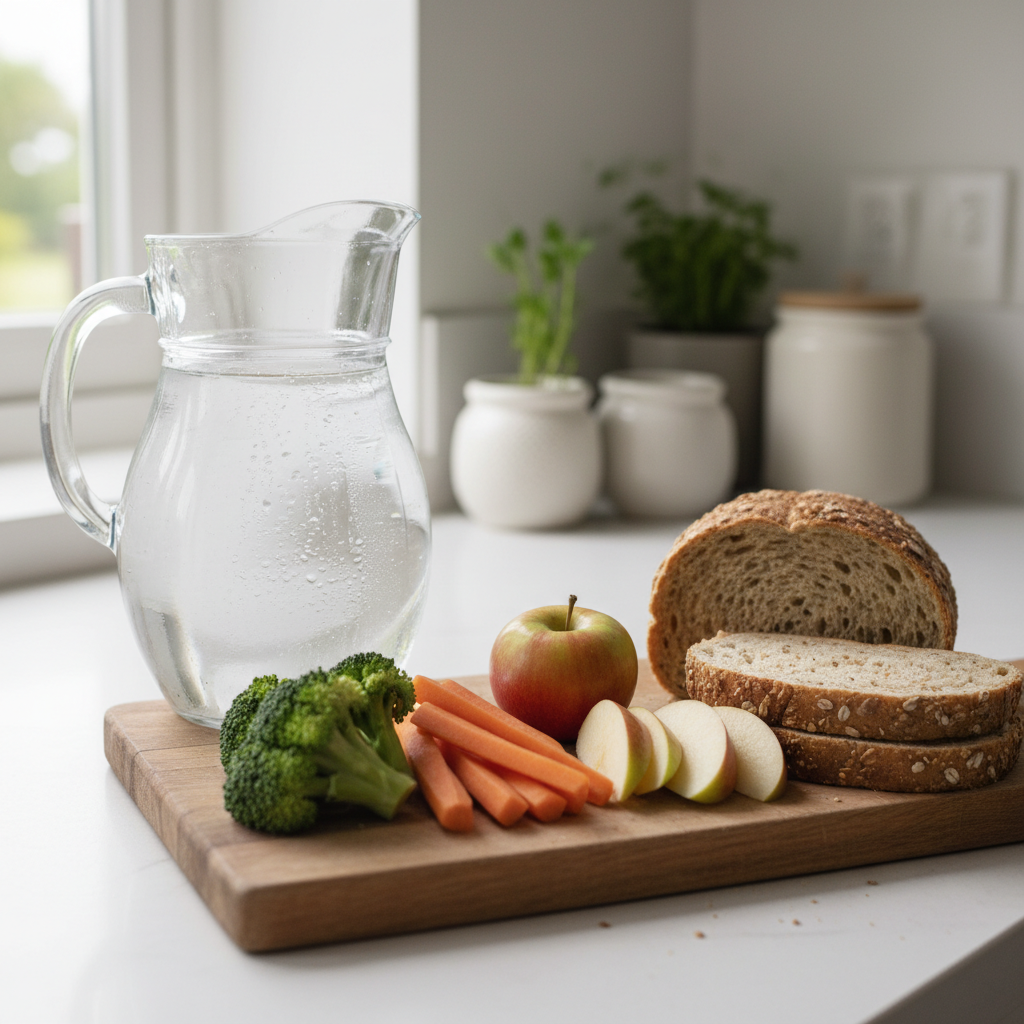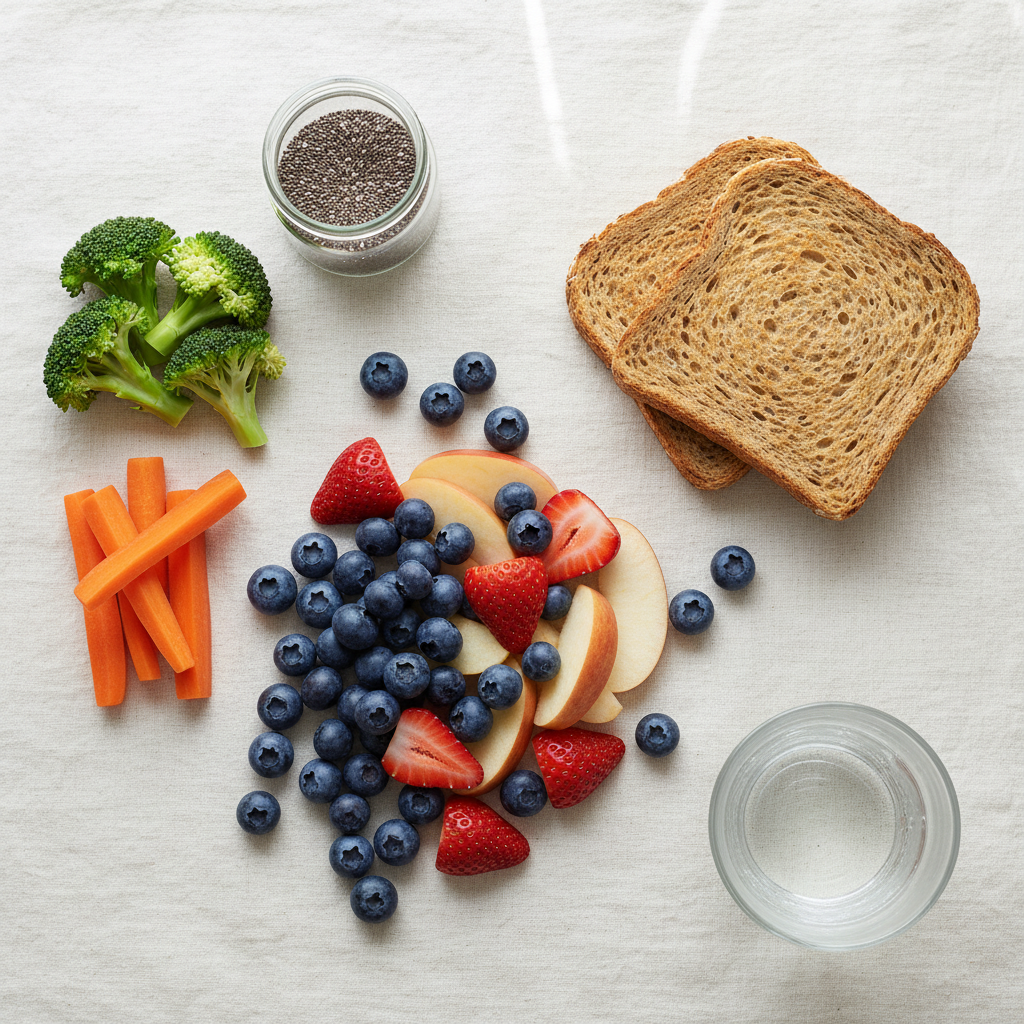
Fiber-Rich Foods to Support Digestive Health During Pregnancy
Digestive discomfort is a common experience during pregnancy, particularly as you move into the second trimester when your growing baby puts more pressure on your digestive system. Increasing your intake of fiber-rich foods can help manage these challenges while supporting your overall health and your baby’s development.
Key Highlights
Here’s what you need to know about incorporating fiber into your pregnancy diet:
- Aim for 25-30 grams of fiber daily during pregnancy to combat constipation
- Fruits, vegetables, whole grains, and legumes are excellent sources of pregnancy-friendly fiber
- Always pair increased fiber intake with plenty of water to help it work effectively
- Gradually increase fiber to avoid bloating and gas
- Fiber supports healthy weight gain and helps regulate blood sugar levels
Understanding Digestive Changes During Pregnancy

As your pregnancy progresses into the second trimester, your digestive system often slows down due to hormonal changes and your growing uterus. This natural slowing helps your body absorb more nutrients for your baby, but it can also lead to uncomfortable constipation and bloating. Many women find these digestive challenges particularly noticeable around weeks 14-26 when the uterus begins exerting more pressure on the intestines.
The hormone progesterone, which increases during pregnancy, relaxes smooth muscle tissue throughout your body, including your digestive tract. This relaxation slows food movement through your intestines, sometimes causing food to sit longer in your digestive system. While these changes serve important purposes for your pregnancy, they can make bathroom trips less comfortable and regular than you’re used to.
Why Fiber Is Essential During Pregnancy
Dietary fiber acts as nature’s digestive assistant by adding bulk to stool and helping it move more easily through your intestines. There are two main types of fiber that work together to support your digestive health: soluble fiber (which dissolves in water and forms a gel-like substance) and insoluble fiber (which doesn’t dissolve but adds bulk to stool). Both types are crucial for maintaining comfortable digestion during the changes of pregnancy.
The American College of Obstetricians and Gynecologists recommends that pregnant women consume 25-30 grams of fiber daily. This amount helps prevent constipation while supporting healthy weight gain and blood sugar regulation. Fiber also feeds beneficial gut bacteria, which contributes to your overall immune health during this important time when your body is working hard to support both you and your baby.
Fiber-Rich Fruits That Support Pregnancy

Fruits provide a delicious way to increase your fiber intake while satisfying pregnancy cravings for sweetness. Berries are fiber superstars, with raspberries containing 8 grams of fiber per cup and blackberries offering 7.6 grams. These colorful fruits also provide vitamin C and antioxidants that support your immune system and your baby’s development during the 2nd trimester.
Apples, pears, and bananas make perfect portable snacks that can help ease digestive discomfort. Keeping the skin on apples and pears (after washing thoroughly) maximizes their fiber content. Dried fruits like prunes and figs are particularly effective for constipation relief, but should be consumed in moderation due to their higher sugar content. A small handful of dried fruit can provide a quick fiber boost when you’re experiencing pregnancy headaches second trimester symptoms that might be exacerbated by constipation.
Vegetables and Whole Grains for Digestive Health
Vegetables provide insoluble fiber that adds bulk to stool, helping to prevent constipation. Dark leafy greens like spinach and kale offer both fiber and folate, which is crucial for your baby’s neural development. Broccoli, carrots, and sweet potatoes are versatile options that can be prepared in various ways to accommodate changing taste preferences and potential food aversions.
Whole grains should form the foundation of your pregnancy diet’s fiber strategy. Oats make an excellent breakfast choice with 4 grams of fiber per cup and can help stabilize blood sugar levels throughout the morning. Brown rice, quinoa, and barley can replace refined grains in meals, boosting both fiber content and nutritional value. Even during your 2nd month pregnancy, establishing these healthy eating patterns sets a foundation for nutritional success throughout your pregnancy journey.
Legumes: Protein and Fiber Powerhouses

Beans, lentils, and chickpeas offer a winning combination of plant-based protein and fiber that makes them particularly valuable during pregnancy. A single cup of black beans provides approximately 15 grams of fiber—more than half your daily requirement. These foods also supply iron and folate, nutrients that support your increased blood volume and your baby’s development.
If you’re concerned about gas when eating legumes, try these approaches to make them more digestible: soak dried beans thoroughly before cooking, rinse canned beans well, and introduce them gradually into your diet. Starting with smaller portions and varieties that are easier to digest, like lentils, can help your digestive system adjust. Adding these fiber sources gradually is especially important when experiencing 2ns trimester digestive sensitivity.
Practical Ways to Increase Your Daily Fiber Intake
Creating a fiber-rich eating pattern doesn’t require dramatic diet changes. Start by making simple swaps like choosing whole grain bread instead of white, adding a piece of fruit to your breakfast, or incorporating beans into soups and salads. Small, consistent changes often prove more sustainable than complete diet overhauls.
Snacking thoughtfully can significantly boost your fiber intake. Keep cut vegetables, fruit, and nuts available for quick snacks. Adding ground flaxseeds or chia seeds to smoothies, yogurt, or oatmeal provides concentrated fiber with minimal taste impact. Remember that timing matters too—spacing fiber intake throughout the day rather than consuming it all at once helps prevent bloating and discomfort while maintaining digestive regularity.
The Essential Water Connection
Fiber works most effectively when paired with adequate hydration. Without sufficient water, fiber can actually worsen constipation instead of relieving it. Aim for at least 8-10 cups (64-80 ounces) of fluid daily, with water as your primary beverage. This amount supports fiber’s work in your digestive system while helping meet your pregnancy’s increased fluid needs.
Herbal teas (pregnancy-safe varieties like ginger or peppermint) can count toward your fluid intake while potentially providing additional digestive benefits. If plain water feels unappealing, try adding slices of cucumber, lemon, or berries for natural flavor. Carrying a reusable water bottle throughout the day serves as a visual reminder to stay hydrated, especially important when you’re managing digestive challenges.
Creating Balance: A Day of Fiber-Rich Eating
Building a balanced approach to fiber doesn’t mean your diet needs to feel restrictive or medicinal. A fiber-rich day might include oatmeal with berries and ground flaxseed for breakfast; a lunch of leafy green salad with chickpeas and whole grain bread; and dinner featuring brown rice with vegetables and lean protein. Snacks like apple slices with nut butter or hummus with carrots add both nutrition and satisfaction.
Remember that moderation and consistency matter more than perfection. Some days your food choices may be limited by nausea, time constraints, or simple preference—and that’s completely normal. Focus on making fiber-rich choices when possible, knowing that the overall pattern of your diet matters more than any single meal or day.
Supporting Your Pregnancy Journey with Fiber
Incorporating fiber-rich foods into your pregnancy diet offers benefits that extend far beyond digestive comfort. As your body nurtures your growing baby, these nutritious foods provide sustained energy, essential nutrients, and a foundation for both your health and your baby’s development. The dietary patterns you establish now may even influence your family’s eating habits long after your baby arrives.
Listen to your body as you make these dietary adjustments, paying attention to how different foods affect your unique digestive system during pregnancy. Work with your healthcare provider if constipation becomes severe or persistent despite dietary changes, as they can offer additional strategies specific to your needs. With thoughtful food choices and proper hydration, you can navigate the digestive challenges of pregnancy while nourishing yourself and your baby optimally.
Sources
American College of Obstetricians and Gynecologists – Nutrition During Pregnancy
Mayo Clinic – Pregnancy Nutrition: Foods to Avoid During Pregnancy
Academy of Nutrition and Dietetics – Healthy Weight During Pregnancy
National Institutes of Health – Diet Affects Gut Microbes in Pregnant Women
